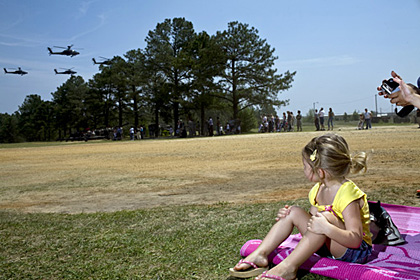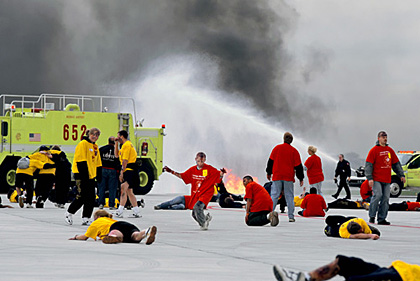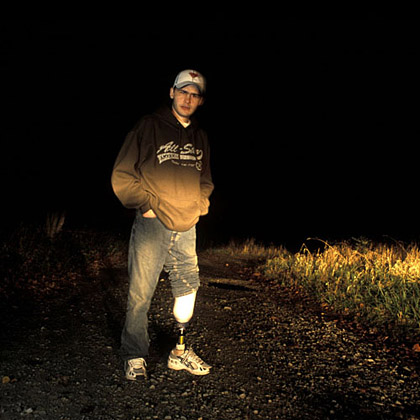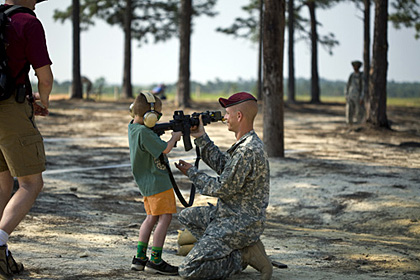
"All America Day with the 82nd Airborne, Ft. Bragg, NC," Nina Berman, All rights reserved
At this moment in history we seem (somehow) to be hurtling simultaneously toward apocalypse & salvation. Nina Berman’s photographs suggest how this might be possible. Her new show Homeland at Jen Bekman Gallery explores America's steadily increasing militarism since 9/11, but not grimly or without irony. Those for whom Bush's word people coined the reassuring rubric "homeland security" may even find some of these pictures comforting. Others (I include myself) will find them chilling.
Berman mostly photographs our dark currents in peaceful sunshine. In her pictures, made at military exercises, public simulations of terrorist attacks, recruitment scenarios & other events, she evokes a traditional America -- one in which mainstream values appear to coexist comfortably with military codes of loyalty & honor. The people in these pictures, in other words, don't resemble anybody's stereotype of hawkish ideologues . Whether enjoying the precision flying of warplanes or enthusiastically play-acting good vs. evil scenarios of terrorist attacks, they seem ordinary -- if anything, more innocent than their typical countrymen.

"Islamic Terrorists attack Midway Airport during a Homeland Security drill in Chicago," Nina Berman, All rights reserved.
They want to be convinced that wars serve a moral purpose. “Some of these events have the look and feel of state sponsored performance art, where realism is replaced by theater, giving participants a powerful sense of identity and value through a militarized experience,” Berman writes.
In other words, we fantasize war before we fight it. This is not news -- young men have always dreamed of glory -- but the massive, full-time, consciously targeted marketing of these fantasies is something else again. Moving well beyond big-budget, sophisticated advertising campaigns for the armed services, the made-up message -- the sell -- has seeped into every aspect of our culture. And the military services are not the only ones making the pitch. Think back just a few years to the waving starred-&-striped "Operation Iraqi Freedom" logos you saw on every TV news screen during the race to Baghdad. Could that really have been the free American press?

"Sam Ross," Nina Berman, All rights reserved
Berman came to this series after years of making sympathetic but unflinching portraits of Iraq War veterans who came home severely wounded. (I wrote about it here.)
Berman writes: "Many of the subjects I photographed said they grew up thinking war would be 'fun.' Many watched the first Gulf War on TV and thought it was 'awesome.' Several said that becoming a soldier meant they would finally do something good in life. "
It's surprising that most Americans don't seem to know -- or perhaps don't care -- that our country makes & sells more weapons than any other. A September 13th article in the NY Times , for instance, described the recent surge of weapons sales under the Bush administration. "The United States has long been the top arms supplier to the world. In the past several years, however, the list of nations that rely on the United States as a primary source of major weapons systems has greatly expanded."
In fact, our own military buildup was already underway long before Bush, Cheney & Rumsfeld decided to invade Iraq. At the height of the Cold War in 1961, outgoing President Dwight D. Eisenhower squarely addressed American militarism in his farewell speech to the nation. Granting that a permanent source of weapons and a large standing army had become necessary, Eisenhower also sounded an unmistakable warning.
"This conjunction of an immense military establishment and a large arms industry is new in the American experience. The total influence -- economic, political, even spiritual -- is felt in every city, every State house, every office of the Federal government," Ike said. "...In the councils of government, we must guard against the acquisition of unwarranted influence, whether sought or unsought, by the military/industrial complex. The potential for the disastrous rise of misplaced power exists and will persist."

"A soldier helps a boy fire a rifle equipped with a laser at human targets, who drop to the ground and play dead when hit. All America Day, Ft. Bragg, NC," Nina Berman, All rights reserved.
But in the end it's not the growth of Ike's military/industrial complex that makes Berman's photograph (above) deeply disturbing. This image's human --what Eisenhower might call its "spiritual" -- implications don't require any policy expertise . The soldier, perhaps the father of the boy, exhibits tenderness & concern, but what does he imagine he's teaching? The boy's fantasy target is not a deer to be hunted. It's a dark-skinned man in a turban.
I wonder. After the boy has "killed" him & watched him fall, what does the boy learn when the "terrorist" gets back up & smiles?
1 comment:
Thank you for the depth in this piece Tim and the inclusion of well-made and terribly disturbing photos. I've not lived at home in the States for ten years now. What upsets me most in reading this piece is my awareness that, here in China, nearly everyone believes that there will eventually be a war with the U.S.A. Sometimes as I listen to them talk about it I hear a current of belief that it is a necessary rung on their ladder to a throne of world-power.
Post a Comment